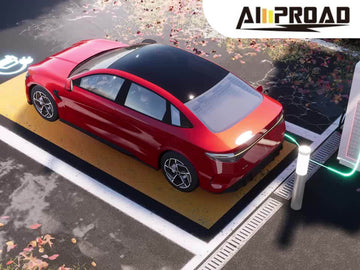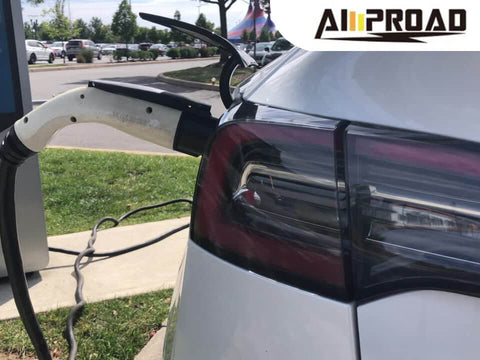
If you're considering charging your electric vehicle at home, you're in the right place. We'll break down everything you need to know about J1772 chargers, covering their benefits, how they work, and whether they're suitable for your home. Whether you're a new EV owner or just curious about home charging options, we've got you covered. Let's dive into the basics of J1772 chargers and make home charging simple and straightforward.
Can You Install a J1772 Charger at Home?
Installing a J1772 charger at home is a feasible and practical solution for electric vehicle (EV) owners seeking convenient charging options. The process involves assessing your electrical capacity, typically requiring a dedicated 240-volt circuit. Consulting with a qualified electrician ensures a smooth installation and compliance with any local regulations or permits. The placement of the charging station is also crucial, with many homeowners opting for garage installations for added security and protection from the elements.
The benefits of having a J1772 charger at home are numerous. The convenience of charging overnight eliminates the need for frequent visits to public stations, saving time and money. Home charging allows for personalized schedules, taking advantage of off-peak electricity rates. Beyond practicality, home-based J1772 chargers contribute to the growth of residential charging infrastructure, fostering sustainable and eco-friendly practices.
J1772 chargers are compatible with standard home electrical systems, specifically 240-volt circuits commonly found in households. This compatibility ensures a seamless integration into existing infrastructure, making J1772 chargers a practical and accessible choice for EV enthusiasts. Additionally, the charging speed of a J1772 Level 2 EV charger at home, influenced by factors like power rating and EV capacity, averages 15 to 30 miles of range per hour. While not as rapid as Level 3 chargers, the convenience of overnight charging ensures a consistently ready EV for daily use.
What Are the Benefits of Having a J1772 Charger at Home?
Having a J1772 charger at home offers a multitude of benefits that enhance the overall experience of electric vehicle (EV) ownership. One of the primary advantages is the unparalleled convenience it brings to EV users. Home-based J1772 charging allows vehicle owners to plug in their cars overnight, ensuring a fully charged battery every morning. This eliminates the need for frequent trips to public charging stations, saving time and providing a hassle-free solution for daily charging needs.
Beyond the sheer convenience, home-based J1772 charging translates into significant cost savings for EV owners. By leveraging off-peak electricity rates, users can optimize their charging schedules to coincide with periods of lower energy costs. This not only reduces the overall cost of charging but also contributes to more efficient and economical use of electricity resources. Additionally, the absence of subscription fees or pay-per-use charges often associated with public charging stations makes home charging a financially savvy choice.
Homeowners may also enjoy potential incentives when opting for a J1772 charger installation at home. Government programs and utility company incentives aimed at promoting residential EV charging infrastructure can offer rebates or subsidies for charger installations. These incentives further sweeten the deal, making the transition to home-based J1772 charging not only practical but also economically advantageous.
For those seeking the fastest home EV charger, J1772 options cater to various electric vehicle models, providing efficient charging solutions. The flexibility of J1772 chargers ensures compatibility with a wide range of EVs, making them a reliable choice for homeowners looking to invest in high-speed charging technology. The combination of convenience, cost savings, potential incentives, and compatibility with the fastest home EV charger makes the J1772 an appealing and user-friendly choice for residential EV charging.

Are J1772 Chargers Compatible with Standard Home Electrical Systems?
Understanding the electrical compatibility of J1772 chargers with standard home systems is crucial for a seamless and efficient charging experience. J1772 chargers typically require a 240-volt circuit, akin to those used for large appliances like stoves or dryers. This higher voltage is a defining characteristic of Level 2 chargers, providing faster EV charging speeds compared to their Level 1 counterparts.
When assessing compatibility with common household circuits and outlets, it's essential to consider the standard voltage available in most homes. The standard residential voltage in the United States is 120 volts. While Level 1 chargers can operate on this voltage, Level 2 charger, including J1772 variants, require a higher voltage for optimal performance.
One noteworthy solution addressing compatibility concerns is the Amproad iflow P9 J1772 charger, designed to accommodate a wide voltage range. With an input range of 90-250 volts, the Amproad charger is versatile and adaptable to various home electrical systems. This means it can work efficiently with the standard 120-volt household circuits commonly found in homes, while also providing optimal performance on higher voltage circuits. This adaptability makes the Amproad J1772 EV charger a user-friendly option for electric vehicle (EV) owners, ensuring compatibility with a broad spectrum of home electrical setups.
To wrap up, while standard home electrical systems may have a 120-volt standard, J1772 chargers, such as the Amproad model with its wide voltage range, can bridge the gap by providing compatibility with common household circuits and outlets. This adaptability not only enhances convenience for EV owners but also underscores the versatility of J1772 chargers in catering to various home charging scenarios, making them an excellent choice for a broad range of electric vehicles and residential setups.
How Fast Can a J1772 Charger Charge an Electric Vehicle at Home?
The charging speed of a J1772 charger at home is a critical factor influencing the overall experience for electric vehicle (EV) owners. These chargers, operating at Level 2, generally provide a faster charging speed compared to Level 1 chargers. The charging speed is determined by the power output of the J1772 charger, measured in kilowatts (kW). Residential J1772 chargers typically offer power outputs ranging from 3.3 kW to 19.2 kW.
Factors influencing the charging speed in a home setting include both the power rating of the J1772 charger and the electric vehicle's (EV) capacity to accept a higher charge rate. For instance, a SAE J1772 charger with a higher power output, such as 19.2 kW, can deliver faster charging than a charger with a lower output, like 3.3 kW. However, the EV's onboard charger also plays a role; if the vehicle can only accept a lower charge rate, the overall charging speed will be limited.
While residential J1772 chargers provide a faster charging solution compared to Level 1 chargers, it's essential for EV owners to manage expectations. The average charging rate for Level 2 chargers, including J1772 variants, falls within the range of 15 to 30 miles of range per hour. While this may not match the rapid charging speeds of Level 3 chargers, it ensures a practical and reliable solution for overnight charging at home. The convenience of having a fully charged EV each morning, coupled with the flexibility to personalize charging schedules, makes J1772 chargers an ideal choice for residential use.

Can I Use J1772 Chargers with Solar Panels at Home?
The integration of J1772 chargers with solar panels at home offers a sustainable and environmentally friendly solution for electric vehicle (EV) owners. J1772 chargers, operating at Level 2, can seamlessly integrate with solar power systems, allowing users to harness clean and renewable energy for their EV charging needs. This integration aligns with the broader trend of creating eco-conscious and sustainable charging solutions, reducing reliance on traditional grid electricity.
The sustainability benefits of combining J1772 chargers with solar panels are substantial. Solar-powered home level 2 charging significantly reduces the carbon footprint associated with EV charging. By utilizing energy harvested from the sun, EV owners can minimize their reliance on grid electricity, which may be generated from non-renewable sources. This not only contributes to a greener environment but also allows EV users to be active participants in promoting sustainable energy practices.
However, considerations should be taken into account when contemplating the use of J1772 chargers with solar panels at home. The capacity of the solar power system and the available sunlight directly impact the charging speed and efficiency. Users should evaluate the size of their solar installation, storage capacity, and daily sunlight exposure to ensure that it aligns with their EV charging needs. Additionally, advancements in energy storage technology, such as home battery systems, can enhance the reliability and efficiency of solar-powered charging by storing excess energy for later use, ensuring a consistent power supply even during periods of low sunlight.
Installation Costs, Incentives, and User-Friendliness for Home J1772 Chargers
Installing a J1772 charger at home involves considering various factors, including installation costs and potential incentives. While the initial investment for a J1772 charger setup can include the cost of the EVCS, electrical work, and other installation necessities, it's essential to note that incentives and rebates may be available. Many regions offer incentives to encourage the adoption of electric vehicles (EVs) and the installation of home charging infrastructure. This can significantly offset installation costs, making it a more economical choice for homeowners looking to embrace electric mobility.
User interface and overall user-friendliness are crucial aspects of home J1772 chargers. These chargers are designed with an intuitive interface, making them user-friendly for homeowners. With features such as plug-and-play functionality and easy-to-understand displays, J1772 chargers provide a seamless experience for users. Additionally, regular maintenance is minimal, contributing to their overall user-friendly design. Homeowners can rely on the efficiency and reliability of J1772 chargers without the need for extensive upkeep.
For homeowners seeking a comprehensive home charging solution, the inclusion of Tesla Destination chargers can further enhance the user experience. Tesla Destination chargers are designed for compatibility with Tesla electric vehicles, providing an additional charging option for Tesla owners at home. The integration of J1772 and Tesla Destination chargers ensures that a diverse range of electric vehicles can be accommodated, making home charging accessible for various EV models. This inclusivity adds versatility to the home charging setup, catering to the needs of different electric vehicle owners in a single, user-friendly infrastructure.
Overall, home J1772 chargers are an attractive option for electric vehicle owners due to their installation costs, available incentives, and user-friendliness. Homeowners can enjoy the convenience of charging their EVs at home and contribute to the adoption of eco-friendly transportation. With the addition of Tesla Destination chargers, home charging solutions become even more accessible and versatile, meeting the diverse needs of EV enthusiasts.
Related articles:
What is tesla destination charging?
Tesla battery replacement cost
How long does a tesla battery last?


